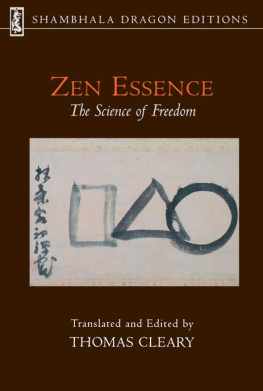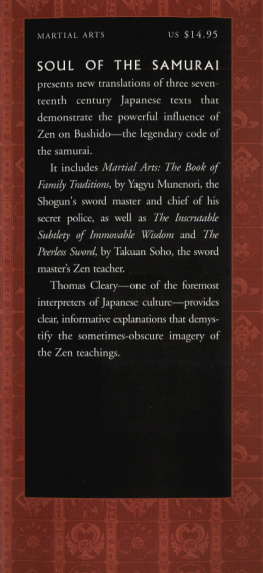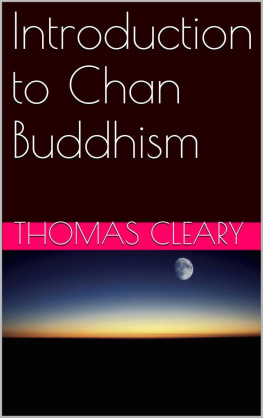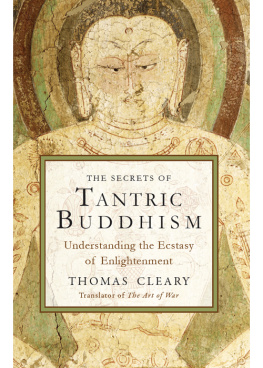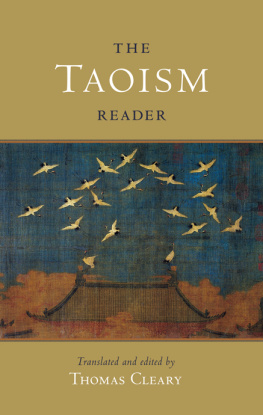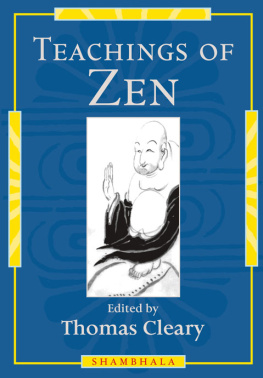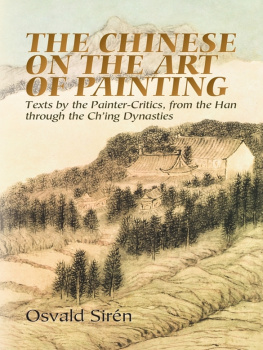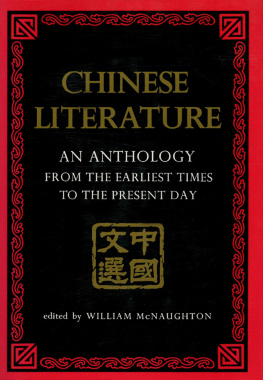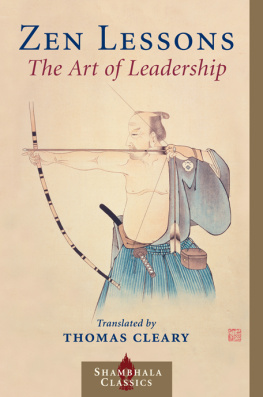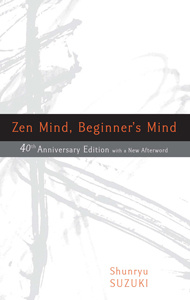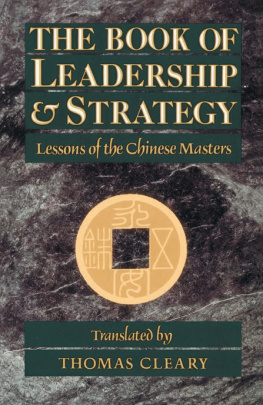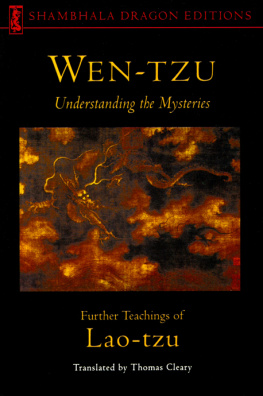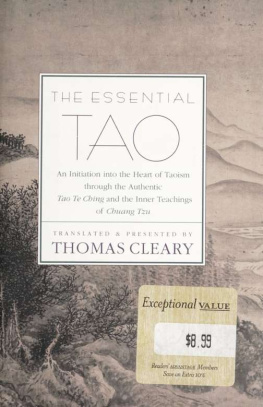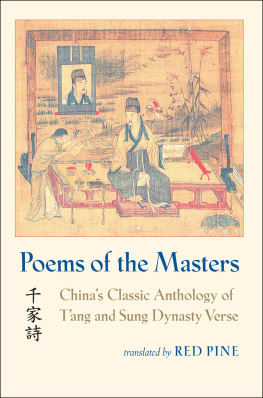Cleary - Zen essence: the science of freedom
Here you can read online Cleary - Zen essence: the science of freedom full text of the book (entire story) in english for free. Download pdf and epub, get meaning, cover and reviews about this ebook. City: Boston;Mass, year: 2000, publisher: Shambhala Publications, genre: Religion. Description of the work, (preface) as well as reviews are available. Best literature library LitArk.com created for fans of good reading and offers a wide selection of genres:
Romance novel
Science fiction
Adventure
Detective
Science
History
Home and family
Prose
Art
Politics
Computer
Non-fiction
Religion
Business
Children
Humor
Choose a favorite category and find really read worthwhile books. Enjoy immersion in the world of imagination, feel the emotions of the characters or learn something new for yourself, make an fascinating discovery.
Zen essence: the science of freedom: summary, description and annotation
We offer to read an annotation, description, summary or preface (depends on what the author of the book "Zen essence: the science of freedom" wrote himself). If you haven't found the necessary information about the book — write in the comments, we will try to find it.
Cleary: author's other books
Who wrote Zen essence: the science of freedom? Find out the surname, the name of the author of the book and a list of all author's works by series.
Zen essence: the science of freedom — read online for free the complete book (whole text) full work
Below is the text of the book, divided by pages. System saving the place of the last page read, allows you to conveniently read the book "Zen essence: the science of freedom" online for free, without having to search again every time where you left off. Put a bookmark, and you can go to the page where you finished reading at any time.
Font size:
Interval:
Bookmark:
The essential Zen teachings, selected from the voluminous Zen canon, known for their accessibility, their clarity, and above all, their practical effectiveness in fostering insight. A truly rewarding book for all earnest seekers of the way to liberation.
East and West Series
ABOUT THE BOOK
Drawn from the records of Chinese Zen masters of the Tang and Song dynasties, this collection may surprise some readers. In contrast to the popular image of Zen as an authoritarian, monastic tradition deeply rooted in Asian culture, these passages portray Zen as remarkably flexible, adaptive to contemporary and individual needs, and transcending cultural boundaries.
The readings contained in Zen Essence emphasize that the practice of Zen requires consciousness alone and does not depend on a background in Zen Buddhism and Asian culture. The true essence of Zen resides in the relationship between mind and culture, whatever that culture might be. This unique collection of writings creates a picture of Zen not as a religion or philosophy, but as a practical science of freedom.
THOMAS CLEARY holds a PhD in East Asian Languages and Civilizations from Harvard University and a JD from the University of California, Berkeley, Boalt Hall School of Law. He is the translator of over fifty volumes of Buddhist, Taoist, Confucian, and Islamic texts from Sanskrit, Chinese, Japanese, Pali, and Arabic.
Sign up to receive weekly Zen teachings and special offers from Shambhala Publications.

Or visit us online to sign up at shambhala.com/ezenquotes.
ZEN ESSENCE
The Science of Freedom
Translated and Edited by
THOMAS CLEARY

SHAMBHALA
Boston & London
2014
Shambhala Publications, Inc.
Horticultural Hall
300 Massachusetts Avenue
Boston, Massachusetts 02115
www.shambhala.com
1989 by Thomas Cleary
All rights reserved. No part of this book may be reproduced in any form or by any means, electronic or mechanical, including photocopying, recording, or by any information storage and retrieval system, without permission in writing from the publisher.
Cover art: Circle, Triangle, and Square by Sengai (17501838). Ink on paper, 11-1/8" 19". Collection of the Idemitsu Museum of Arts, Tokyo. Reproduced by permission.
LIBRARY OF CONGRESS CATALOGING-IN-PUBLICATION DATA
Zen essence: the science of freedom / translated & edited by Thomas Cleary.
p. cm.(Shambhala pocket classics)
eISBN 978-0-8348-2927-5
ISBN 1-57062-097-0
1. Zen BuddhismDoctrines. 2. Spiritual lifeZen Buddhism.
I. Cleary, Thomas F., 1949 . II. Series.
BQ9268.7.Z45 1995 94-36157
294.3927dc20 CIP
CONTENTS
Zen is the essence of Buddhism, freedom is the essence of Zen. At its simplest and most profound level, Zen is purely devoted to liberating the hidden potential of the human mind. The Chinese Zen master Ying-an said, Zen living is a most direct shortcut, not requiring the exertion of the slightest bit of strength to attain enlightenment and master Zen right where you are.
The freedom that Zen proposes is not remote, but right in this world. It does not require anything extraneous, but can be put into practice in the midst of normal occupations and activities. It is applicable immediately, and develops naturally. Dahui, another great Chinese Zen master, said, To attain Zen enlightenment it is not necessary to give up family life, quit your job, become a vegetarian, practice asceticism, or flee to a quiet place.
Yet even while effectively in the world, Zen freedom is not essentially of the world; it is not the same as a freedom that can be instituted or granted by a social or political system. According to Zen teaching, freedom that depends on things of the world can be undermined, and freedom that can be granted can be taken away. Aiming for freedom that cannot be undermined and cannot be taken away, Zen liberation reaches out from within. By its very nature it cannot enter in from outside the individual mind.
Zen liberation is essentially achieved by special knowledge and perception that penetrate the root of experience. This knowledge and perception free the mind from the arbitrary limitations imposed on it by conditioning, thus awakening dormant capacities of consciousness. Dahui explained:
The realm of the enlightened is not an external realm with manifest characteristics; buddhahood is the realm of the sacred knowledge found in oneself. You do not need paraphernalia, practices, or realizations to attain it. What you need is to clean out the influences of the psychological afflictions connected with the external world that have been accumulating in your psyche since beginningless time.
Zen cleans the mind for inner perception of its own essential nature; then inner perception of minds essential purity enables one to remain spontaneously poised and free in all circumstances, so that one may go on clarifying daily experience. The old Japanese Zen master Bunan said,
People think it is hard to perceive the essential human nature, but in reality it is neither difficult nor easy. Nothing at all can adhere to this essential nature. It is a matter of responding to right and wrong while remaining detached from right and wrong, living in the midst of passions yet being detached from passions, seeing without seeing, hearing without hearing, acting without acting, seeking without seeking.
Enlightened Zen freedom, being in the world yet not of the world, is traditionally likened to a lotus flower, rooted in the mud while blossoming over the water. It is not a negative detachment but a balance of independence and openness. Therefore it is not realized by formal effort but by direct experience and unfolding of the essence of the human mind.
The paradox of Zen freedom is that it is present and available, yet somehow elusive when deliberately sought. It responds to what Bunan called seeking without seeking. Ying-an put it this way: Zen has nothing to grab on to. When people who study Zen dont see it, that is because they approach too eagerly.
For this reason, classical Zen books are not manuals of doctrine or ritual to be followed as systematic courses of Zen that are supposed to lead one and all step by step to the inner sanctum. They are written to awaken sleeping dimensions of consciousness, not to inculcate ideas or beliefs.
Countless systems have been devised to approach Zen since the disappearance of the original schools, but none of them is complete or final, and none of them lasts. This is simply the nature of Zen, which speaks to the personal experience of each individual and each time. It is also true of all Buddhist schools, as their scriptures attest. Zen master Dahui said, If you think there are any verbal formulations that are special mysterious secrets to be transmitted, this is not real Zen.
Zen adds extra dimension to consciousness in both rational and intuitive modes. It does so by deepening and sharpening thought, and by fostering a special kind of insight or knowledge more subtle than thought. Since it is axiomatic that this kind of mental development ultimately cannot be given and cannot be taken, Zen learning needs its own approach.
The essence of the Zen approach is deceptively simple, as explained by the Chinese master Yuanwu: Set aside all the slogans you have learned and all the intellectual views that stick to your flesh. Zen is the freshest essence of mind, already gone by the time it becomes an idea. The Zen meaning of literature is impact, not ideology.
Next pageFont size:
Interval:
Bookmark:
Similar books «Zen essence: the science of freedom»
Look at similar books to Zen essence: the science of freedom. We have selected literature similar in name and meaning in the hope of providing readers with more options to find new, interesting, not yet read works.
Discussion, reviews of the book Zen essence: the science of freedom and just readers' own opinions. Leave your comments, write what you think about the work, its meaning or the main characters. Specify what exactly you liked and what you didn't like, and why you think so.

